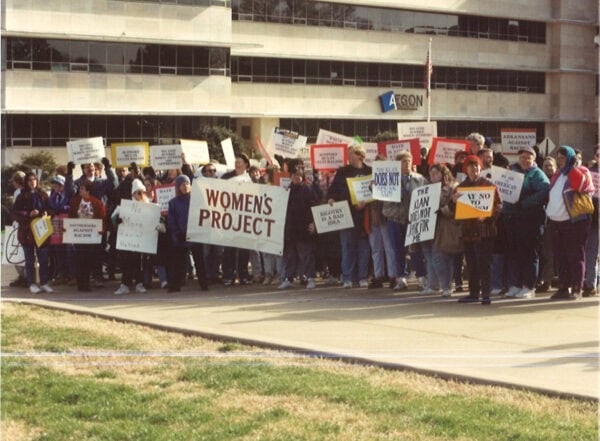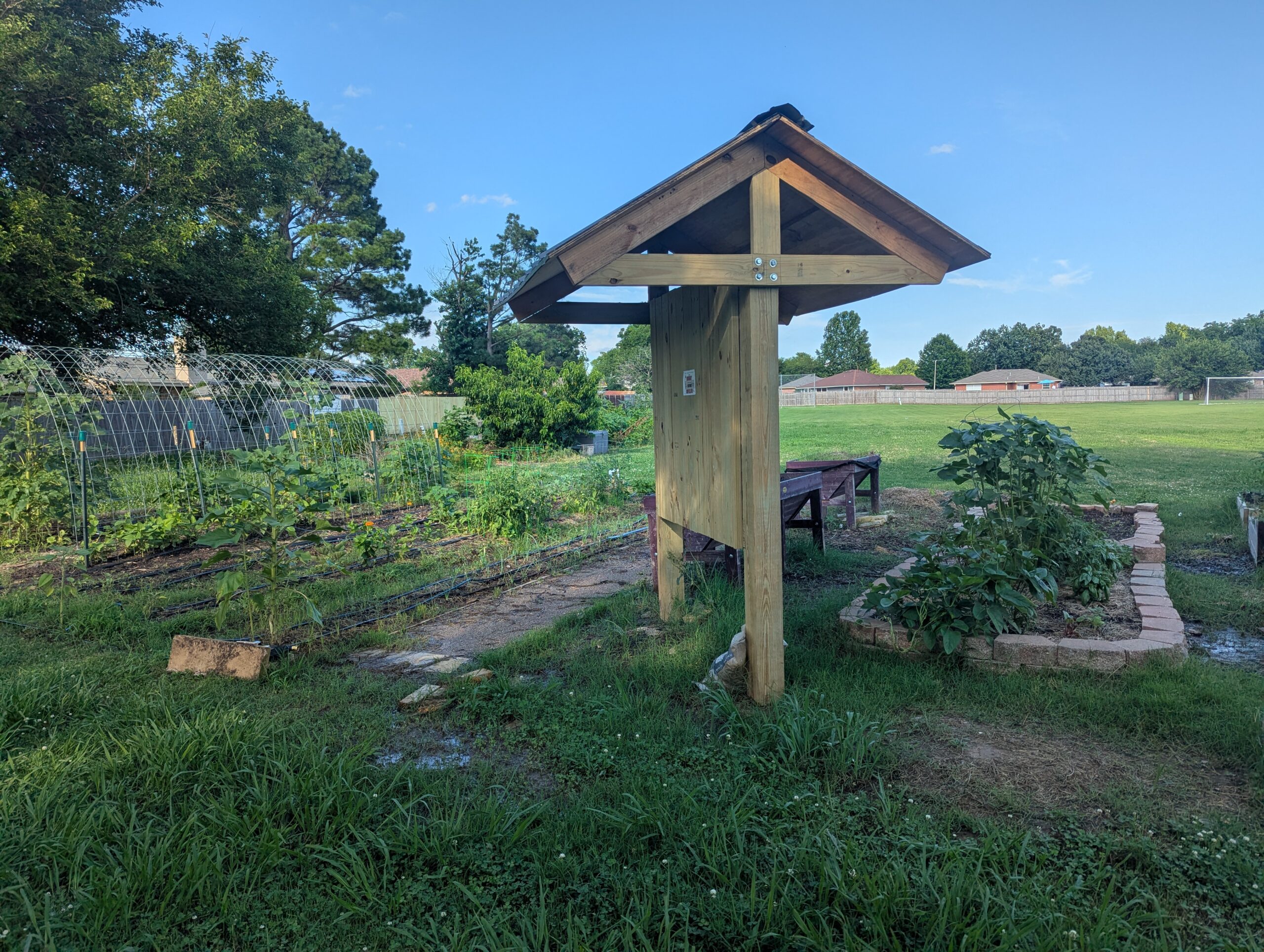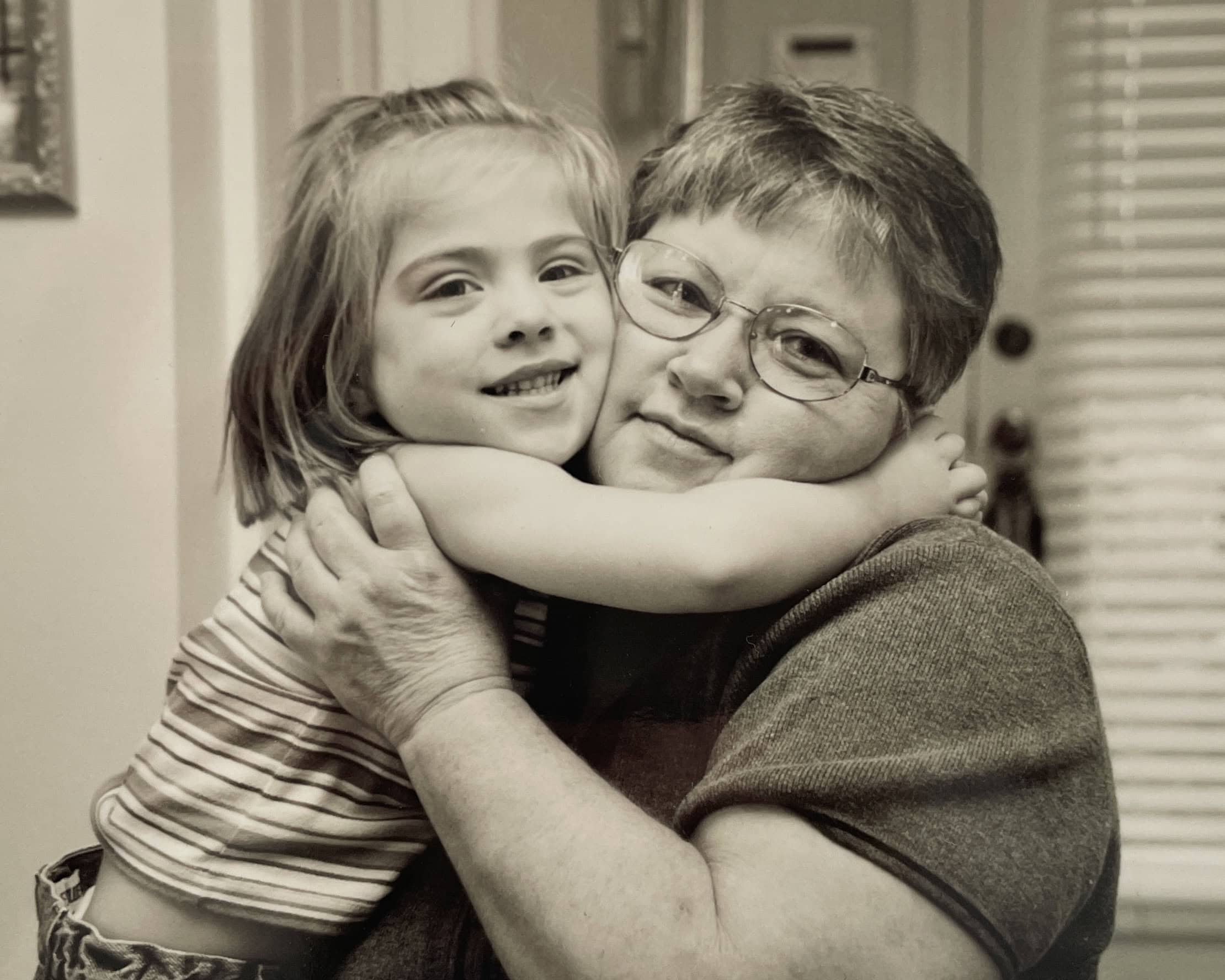Editor’s Note: This is the second installment of a two-part column. The first installment can be found here.
Drawing from the example of forward-thinking public history projects such as the Freedom Archives, the Arkansas People’s History Project—an effort to strengthen future organizing through participatory processes of documenting and sharing past struggles against repression—has set out to create a model for challenging dominant narratives about Arkansas’s past. We are currently working to document the early history of the Women’s Project,a multiracial women-led organization started in 1980 to address misogyny, racism, and homophobia across the state. Through collaborative projects, public historians can transform our own practice by applying what we learn from partner communities and exploring the redistributive possibilities of our work.

Members of the Women’s Project protest the Ku Klux Klan at the Arkansas State Capitol. Courtesy Lynn Frost
Boasting no major cities and a significantly rural population, Arkansas is a low-resource, high-poverty state that barely registers in the average American’s consciousness. There is a distinct perception among many Arkansans that important events happen elsewhere, not here. Some communities, like towns in Phillips County after the Elaine Massacre, have faced active suppression of movement history, and adopted codes of silence to survive in places where telling the truth about history could get you killed.
We have also observed a pervasive, statewide inferiority complex, which may lead people to believe their stories are not worth telling. While traveling across Arkansas this summer to record oral histories with former Women’s Project members, my fellow project coordinators and I heard many people say some variation of, “Well, I don’t know if I have anything useful to share,” before launching into several hours of incredible testimony about their lives and work. Their disclaimers may have been manifestations of self-deprecating southern humility and not true indicators of low self-esteem, but we learned to reassure each person by affirming our belief in the value of their story at the beginning of the interview and reflecting back some of our main takeaways after each interview.
One of the biggest ways movement historians can honor the stories of the communities we work alongside is to transform our own practice by applying what we learn from them. In January, the Museum Archipelago podcast featured the Colored Conventions Project (CCP), which collects and curates documents from one of the biggest African American political movements of the 19th century. The episode highlighted ways the CCP lives out the principles embodied by the ancestors it honors. For example, they “affirm Black women’s centrality to nineteenth-century Black organizing” by consistently acknowledging their names and roles and requiring that those using CCP collections do the same. Actions like these combat erasure and reinforce respect for the wholeness of Black communities.
We have been inspired by the culture Women’s Project members created to facilitate genuine solidarity across lines of difference.
At the Arkansas People’s History Project, we have been similarly inspired by the culture Women’s Project members created to facilitate genuine solidarity across lines of difference, which included paying all staff the same hourly rate, regardless of whether they cleaned the office or managed a large project. All labor was equally valued and dignified. As the Arkansas People’s History Project gains funding, we are also committed to offering equal compensation to all workers, as well as finding ways to resource those typically seen as “research subjects” who otherwise give much of their labor for free.
Initially, the Arkansas People’s History Project planned to put decision-making power directly into the hands of former Women’s Project members. We wanted them to collectively determine how they wished their stories to be gathered, the primary audiences, and the end media product. We quickly found that members were busy with their lives, had limited capacity, and were happy to give their blessing and leave the implementation to us.
Rather than fall back into the traditional extraction of information, our commitment to accountability required that we make some adjustments. First, we acknowledged the trust placed in us to direct the collection and sharing of stories. Then, we listened. Based on what we heard during the first round of oral histories, we plan to convene Women’s Project members to record story circles and engage in dialogue with younger generations that have built upon the work they started. Finally, we individually check in with a growing list of people via phone and email.
We also acknowledged the fact that white women are overrepresented within the Arkansas People’s History Project, as with most work in the field of public history. Stories from the Women’s Project have deepened our knowledge about models for multiracial work in Arkansas and how white women with education and class privilege can play strategic roles in organizing and public history. For documentation of the Women’s Project history, that meant taking on the majority of work ourselves.
Learning from the intersectional work of the Women’s Project has reinforced our commitment to the diverse histories we will lift up moving forward.
There are many redistributive possibilities within public history. We can construct grant budgets to allow for the purchase of local goods and services, pay workers a living wage, and lend equipment like language interpretation sets and audio recorders for use in other efforts. Public historians can also work to make institutional resources accessible to more people. We can negotiate wider community access to free meeting space, offer trainings that facilitate public use of archives, and digitize primary sources for online access. Through trainings, we can transfer skills in oral history, audio and video recording, media production, and grant writing. Such resource-sharing increases the ability of people to document community history, with the added benefit of growing tangible job skills.
Learning from the intersectional work of the Women’s Project has reinforced our commitment to the diverse histories we will lift up moving forward. Resistance to oppression has been ongoing across the state by all kinds of people at every point in history, from Caddo resistance to colonization in the 18th century to more recent organizing against fracking in the Ozarks. Our next project site will focus on immigrant worker organizing over the last 30 years in northwest Arkansas. A place-based working group of people with direct connections to immigrant life and organizing will hold decision-making power from the start. The white women that have coordinated documentation of the Women’s Project history will fall back to focus on administrative work, supporting and amplifying stories, and connecting people on the ground with training in historical research and media production. From our work with the Women’s Project, we have recognized that all future work will have to account for the particularities of each story, place, and group of people. No one process will fit all. We are eager to continue learning and evolving our practice as we engage in mutual support for a people’s history of Arkansas.
Acadia Roher, a 2019 AHA summer columnist, is a first-year graduate student in public history at the University of Arkansas at Little Rock and co-founder of the Arkansas People’s History Project.
This work is licensed under a Creative Commons Attribution-NonCommercial-NoDerivatives 4.0 International License. Attribution must provide author name, article title, Perspectives on History, date of publication, and a link to this page. This license applies only to the article, not to text or images used here by permission.


